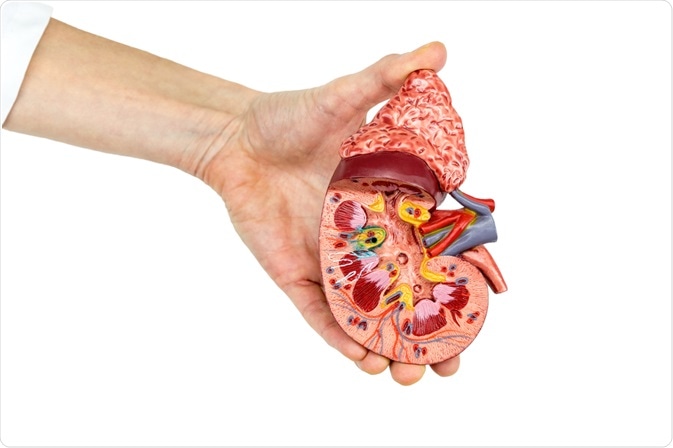Chronic kidney disease (CKD) is a health condition that involves the reduced function of the kidneys. There are various causes of reduced kidney function and the severity of the condition can vary greatly.
It is estimated that approximately 10% of all individuals have some degree of CKD. CKD can develop in an individual of any age; however, this condition is more common among the elderly and females.

Image Credit: Ben Schonewille / Shutterstock.com
Signs and symptoms
Initially, there are few noticeable symptoms of reduced kidney function, as the body naturally has greater kidney function than is required. However, as CKD progresses and the renal function continues to decline, several symptoms may become evident. These may include:
- Urination changes: Frequent urination at night, painful urination, cloudy or foamy urine appearance.
- Peripheral edema: Swelling in the hands and feet due to reduced excretion of bodily fluids.
- Fatigue: Feeling tired due to anemia for reduced production of erythropoietin (EPO) in the kidneys
- Itchy skin: Waste products build up in the blood and can cause significant itching.
- Loss of appetite and weight: The accumulation of waste products in the blood can cause loss of appetite, nausea, vomiting and, as a result, lead to weight loss.
- Dyspnea: Shortness of breath can arise due to associated anemia or fluid build-up in the lungs.
- Dizziness: This symptom is linked to a reduced supply of oxygen to the brain.
Diagnosis
CKD is usually diagnosed with a simple blood test to estimate the volume of blood that is filtered by the kidneys in a given time.
The estimated glomerular filtration rate (eGFR) can be calculated from the concentration of creatinine in a blood sample to estimate the volume of blood that is filtered through the glomeruli in the kidneys per minute. A healthy person typically has an eGFR greater than 90 mL/min; therefore, an eGFR that is less than this may be an indicator of impaired kidney function.
There are five stages of CKD, which include:
- Stage 1 (G1): Normal eGFR (>90 mL/min) with evidence of kidney damage from other tests.
- Stage 2 (G2): Slightly decreased eGFR (60-89).
- Stage 3a (G3a): Mildly decreased eGFR (45-59) with mild to moderate decrease in kidney function.
- Stage 3b (G3b): Moderately decreased eGFR (30-44) with a moderate to a severe reduction in kidney function.
- Stage 4 (G4): Severely decreased eGFR (15-29) with a severe reduction in kidney function and possible symptoms evident.
- Stage 5 (G5): Severely decreased eGFR (<15). This stage of CKD is often referred to as renal failure.
As it is normal for the eGFR to vary slightly over time, it is necessary to take several measurements at different times to confirm a diagnosis of CKD.

Image Credit: CHEN I CHUN / Shutterstock.com
Treatment
A general practitioner can treat most cases of CKD in the early stages of the disease without referral to a specialist. However, referral to a specialist is often beneficial for patients with stage 4 or stage 5 CKD.
Initially, it is important to identify and address any underlying conditions that may be causing the function of the kidneys to worsen. Specifically, diabetes and hypertension are common causes of the disease. Certain lifestyle modifications or medications can be beneficial in manage these factors.
The next phase of treatment is to prevent or slow the progression of the disease. It is important to avoid the use of medications that are linked to worsening of kidney function, such as nonsteroidal anti-inflammatory drugs (NSAIDs). Additionally, ensuring that the affected individual's weight and blood pressure are in the normal range is also beneficial.
Patients with CKD are more likely to be affected by cardiovascular disease (CVD). Therefore, it is worthwhile to prevent related complications if possible. This includes lifestyle modifications such as adopting a healthy diet and exercise habits, in addition to appropriate medications, if required.
References
Further Reading
Last Updated: May 23, 2021